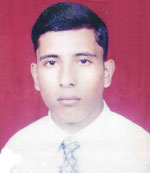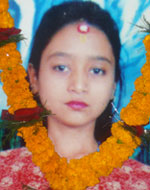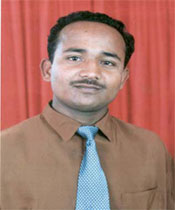Related Links
Case Updates
Krishna Adhikari
 On 6 June 2004, Krishna Prasad Adhikari, a resident of Fujel village of Gorkha District, was murdered in Chitwan District by Maoist cadres. Krishna Prasad was visiting his grandparents after having taken the SLC examinations, and he was abducted from Bakullahar Chowk by men who came on a motorcycle ...
On 6 June 2004, Krishna Prasad Adhikari, a resident of Fujel village of Gorkha District, was murdered in Chitwan District by Maoist cadres. Krishna Prasad was visiting his grandparents after having taken the SLC examinations, and he was abducted from Bakullahar Chowk by men who came on a motorcycle ... Maina Sunuwar
 Around 6 am on February 17, 2004, a group of RNA soldiers arrested Ms
Maina Sunuwar, a 15-year-old schoolgirl of Kharelthok VDC-6, Kavre
district. She disappeared since her arrest. Her family members, with
support from villagers and school where Maina was a student, visited
detention centers ...
Around 6 am on February 17, 2004, a group of RNA soldiers arrested Ms
Maina Sunuwar, a 15-year-old schoolgirl of Kharelthok VDC-6, Kavre
district. She disappeared since her arrest. Her family members, with
support from villagers and school where Maina was a student, visited
detention centers ... Sanjeev Kumar Karna
 Sanjeev Kumar Karna was one among the 11 persons arrested on October 8, 2003. On that fateful day, they had gone to attend a picnic program organized by the students at a place called Kariyachauri VDC-4, and from picnic, they went to Kataiya Chowri Area of Dhanusha district where they ate some food ...
Sanjeev Kumar Karna was one among the 11 persons arrested on October 8, 2003. On that fateful day, they had gone to attend a picnic program organized by the students at a place called Kariyachauri VDC-4, and from picnic, they went to Kataiya Chowri Area of Dhanusha district where they ate some food ... Arjun Bahadur Lama
Arjun Bahadur Lama, 48 years in age, permanent resident of Chhatrebas
VDC -5, Dapcha in Kavre district was abducted by a group of Maoist
cadres, three in number, on 29 April 2005 (2062.1.16 BS) from the
premises of Sri Krishna Secondary School at Chhatrebas VDC-1 of the
district.
» more
Hari Prasad Bolakhe
Hari Prasad Bolakhe, 35 (while missing) a permanent resident of Phulbari VDC-8, Kavre district, a pastor by profession, had been missing since the arrest December 27, 2003, was reportedly killed by security persons. A team of National Human Rights Commission discovered a human skeleton in a jungle ...
» more
Sarala Sapkota
Around 11 p.m. on July 15, 2004, a group of 12 armed soldiers arrested
Sarala Sapkota at her grandfather’s house. The family, who witnessed the
arrest, stated that soldiers gave Sarala no reason for her arrest.
After her arrest, Sarala’s family went to Baireni barracks and the DPO ...
» more
Birendra Shah
On the evening of 5 October 2007, Mr. Birendra Shah, 34, resident of Inruwasira VDC-8, Bara district, a local journalist of Bara district and correspondent of Nepal FM, Avenues Television and Dristi weekly, was abducted by Maoists from Pipara Bazaar in Kalaiya, the district headquarters of Bara ...
» more
Bishwanath Parajuli, Tom Nath Poudel and Dhan Bahadur Tamang
Three persons namely Bishwonath Parajuli (also called Nagendra
Parajuli), Tom Nath Poudel and Dhan Bahadur Tamang of Hasandaha VDC,
Morang were shot dead by the security personnel on 28 September 2004.
According to the eyewitnesses, other victims and the villagers, about 16
people were arrested ...
» more
Chot Nath Ghimire and Shekhar Nath Ghimire
Chot Nath Ghimire, a 58-year-old farmer, resident of Ishaneshor VDC-4,
Ratamate Majhpokhari of Lamjung district was allegedly arrested by the
Joint Security Forces of Joint Security Camp stationed at Bhorlatar VDC,
Lamjung district on February 2, 2002 (2058.10.20). The security camp
called Mr. ...
» more
Bhauna Tharu
Bhauna Tharu (Bhauna Chaudhary in the citizenship card), 21 years old
male (at the time of the incident; Date of Birthe: 8 September 1978),
son of Purna Bahadur Chaudhary, permanent resident of Sujanpur village,
Neulapur VDC-4, Bardiya district, and an employee of Rastriya Gobar Gas,
Gulariya, ...
» more
Ratification of the Third Optional Protocol to the United Nations Convention on the Rights of the Child on a Communications Procedure
To,
Rt. Hon. Dr. Baburam Bhattarai
Prime Minister of Nepal
Office of the Prime Minister and Council of Nepal
Singh Durbar
P.O. Box: 43312
Kathmandu
Nepal
Fax: +977 1 4211 086
Email: info@opmcm.gov.np,
bhattaraibaburam@gmail.com
Re: Ratification of the third Optional Protocol to the United Nations Convention on the Rights of the Child on a Communications Procedure
Your Excellency,
As Nepal has been a State Party to Convention on the Rights of the Child (CRC) since 1990, the Asian Human Rights Commission (AHRC) and a group of national NGOs working on child rights take this opportunity to call on you to ratify the third Optional Protocol to the Convention on the Right of the Child on a communications procedures, adopted on 19 December 2011 by the General Assembly in its resolution 66/138. The signing ceremony is scheduled for 28 February 2012 in Geneva, Switzerland and thereafter at United Nations Headquarters in New York.
This new Optional Protocol will enable children, or their representatives, who claim that their rights have been violated, to bring a complaint to the UN Committee on the Rights of the Child, in cases where domestic remedies have been exhausted. This procedure recognises the rights of the child as forming an integral part of the human rights framework. It will be the only complaint mechanism covering the full range of rights guaranteed under the CRC and should significantly contribute to empower victims whose rights have been violated under the CRC in seeking remedies.
Since joining the United Nations in 1955, Nepal has made being an active member of the UN a key pillar of its foreign policy. In addition, Nepal has further shown its commitment to the rights of the child by ratifying the Optional Protocol to the Convention on the Rights of the Child on the Sale of Children, Child Prostitution and Child Pornography in 2006 and the Optional Protocol to the Convention on the Rights of the Child on the Involvement of Children in Armed Conflict in 2007. The ratification of the third Optional Protocol to the CRC would further enhance the image of Nepal as a positive player in the international community. It would also send an important message to the world that Nepal is fully committed to the protection and promotion of child rights both at home and internationally.
The new Optional Protocol does not impose new substantive obligations on the government of Nepal, but assists it in fulfilling its obligations under the CRC. We believe that the speedy ratification of the Optional Protocol should be possible as a result of this. On the occasion of its Universal Periodic Review, Nepal accepted recommendations by numerous States, including Egypt, the Philippines, Azerbaijan and Cuba concerning the need to strengthen measures protecting child rights, notably through the development of a robust juvenile justice system. The communication procedure established by the Optional Protocol would assist Nepal in upholding these commitments. It complements the government reporting to the CRC and, as the Optional Protocol takes effect where the local remedies have failed or are non-existent, will encourage State Parties to develop such domestic remedies and mechanisms for the promotion and protection of child rights and in order to provide effective remedies.
Your Excellency, we call on you to show leadership on this issue. By becoming a party to the new Optional Protocol, your government would reassert its commitment to respect and protect the child rights and to fulfil the obligations it accepted when it became a party to the CRC. Furthermore, this represents an opportunity for Nepal to play an important role at the forefront of efforts to protect child rights in South Asia.
Thank you,
Sincerely yours,
Cc: Ministry of Women, Children and Social Welfare, NEPAL
Ministry of Foreign Affairs, NEPAL
Ministry of Law and Justice, NEPAL
« Back to overview
Rt. Hon. Dr. Baburam Bhattarai
Prime Minister of Nepal
Office of the Prime Minister and Council of Nepal
Singh Durbar
P.O. Box: 43312
Kathmandu
Nepal
Fax: +977 1 4211 086
Email: info@opmcm.gov.np,
bhattaraibaburam@gmail.com
Re: Ratification of the third Optional Protocol to the United Nations Convention on the Rights of the Child on a Communications Procedure
Your Excellency,
As Nepal has been a State Party to Convention on the Rights of the Child (CRC) since 1990, the Asian Human Rights Commission (AHRC) and a group of national NGOs working on child rights take this opportunity to call on you to ratify the third Optional Protocol to the Convention on the Right of the Child on a communications procedures, adopted on 19 December 2011 by the General Assembly in its resolution 66/138. The signing ceremony is scheduled for 28 February 2012 in Geneva, Switzerland and thereafter at United Nations Headquarters in New York.
This new Optional Protocol will enable children, or their representatives, who claim that their rights have been violated, to bring a complaint to the UN Committee on the Rights of the Child, in cases where domestic remedies have been exhausted. This procedure recognises the rights of the child as forming an integral part of the human rights framework. It will be the only complaint mechanism covering the full range of rights guaranteed under the CRC and should significantly contribute to empower victims whose rights have been violated under the CRC in seeking remedies.
Since joining the United Nations in 1955, Nepal has made being an active member of the UN a key pillar of its foreign policy. In addition, Nepal has further shown its commitment to the rights of the child by ratifying the Optional Protocol to the Convention on the Rights of the Child on the Sale of Children, Child Prostitution and Child Pornography in 2006 and the Optional Protocol to the Convention on the Rights of the Child on the Involvement of Children in Armed Conflict in 2007. The ratification of the third Optional Protocol to the CRC would further enhance the image of Nepal as a positive player in the international community. It would also send an important message to the world that Nepal is fully committed to the protection and promotion of child rights both at home and internationally.
The new Optional Protocol does not impose new substantive obligations on the government of Nepal, but assists it in fulfilling its obligations under the CRC. We believe that the speedy ratification of the Optional Protocol should be possible as a result of this. On the occasion of its Universal Periodic Review, Nepal accepted recommendations by numerous States, including Egypt, the Philippines, Azerbaijan and Cuba concerning the need to strengthen measures protecting child rights, notably through the development of a robust juvenile justice system. The communication procedure established by the Optional Protocol would assist Nepal in upholding these commitments. It complements the government reporting to the CRC and, as the Optional Protocol takes effect where the local remedies have failed or are non-existent, will encourage State Parties to develop such domestic remedies and mechanisms for the promotion and protection of child rights and in order to provide effective remedies.
Your Excellency, we call on you to show leadership on this issue. By becoming a party to the new Optional Protocol, your government would reassert its commitment to respect and protect the child rights and to fulfil the obligations it accepted when it became a party to the CRC. Furthermore, this represents an opportunity for Nepal to play an important role at the forefront of efforts to protect child rights in South Asia.
Thank you,
Sincerely yours,
| Mr. Wong Kai Shing Executive Director Asian Human Rights Commission |
Dr. Hari Bansh Tripathi Director Advocacy Forum– Nepal |
| Churna Bahadur Chaudhary Executive Director Backward Society Education (BASE) Nepal |
Dr. Bijaya Sainju Executive Chairperson/Director Concern for Children and Environment (Concern) Nepal |
|
Anjana Shakya Chairperson Himalayan Human Rights Monitors (Himrights) |
Cc: Ministry of Women, Children and Social Welfare, NEPAL
Ministry of Foreign Affairs, NEPAL
Ministry of Law and Justice, NEPAL
























Join Us